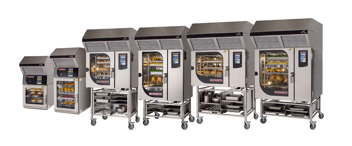Tips for Maintaining Your Commercial Refrigeration Unit

If you're looking for longevity with your commercial refrigeration unit, the key is to properly maintain it. Most people only think to call in an expert when their unit is broken, or needs to be looked at in order to function properly, but following some easy maintenance tips semi-regularly can keep your system functioning, and prevent those dreaded downtime related costs.
Going in and examining your refrigeration system allows you to get to know the shape and condition you're working with. You cannot possibly know how to diagnose an error in the future, if you have no idea what a fully-functioning unit looks like. Luckily, with these five easy tips, you'll be well on your way to properly maintaining your commercial refrigeration unit like a boss.
1. Keep the evaporator coil clean
The evaporator coil is a crucial part of any commercial refrigeration unit. It's the heart and center of a functioning unit. It's sole function is to absorb heat and warmer moisture when it comes into contact with it. It's located next to the evaporator fan, and those two components make sure that no heat is built up in the system.
You can help maintain the evaporator coil by making sure that the area around it is kept clean, and free of surrounding debris. Another tip to help the coil do its job properly is to make sure not to place hot food items into any refrigeration unit; allow the food to reach room temperature before placing it inside. It keeps your coil and fan from working extra hard to remove that hot air.
2. Dust off those air filters
Dust and grease are literally the enemies of the refrigeration air filters. Blocked air vents make it harder to maintain proper airflow through the refrigeration unit. Dust and grease can also damage an air filter.
Take some time to properly dust off and/or degrease your air filters. Your manual should be able to provide you more information about how to do it properly for your specific make and model.
3. Inspect the door gasket
Refrigeration door gaskets keep the cool air inside, and the warm air out. Unfortunately, the door gaskets are also one of the quickest areas to show signs of wear and tear based on the constant in and out nature. Adding in any type of carting or freight back and forth can cause them to wear out even faster. Be on the constant look out for tears, splits, or cracks in your door gasket. If it needs replacing, make sure to check your manual and only replace it with the manufacturer parts that are suggested to fit that specific model or serial number.
4. Regularly clean the unit
Stop and ask yourself, "When was the last time my refrigeration unit was deep cleaned?" The best practice is to get on a weekly or bi-weekly schedule to really clean.
- Remove any items and place them in a safe location.
- Use room temperature or lukewarm water and soap to gently scrub all the surfaces and shelving with a brush. If you have persistent areas that require more "scour power" you can use baking soda to remove any grease. Avoid using bleach or abrasive sponges.
- Clean the stainless steel exterior.
- Properly sanitize and disinfect all cleaning supplies.
5. Check and clean your drain pan
This one is less-than-glamorous. If you're getting any weird odors or pungent smells, there is a good chance that you need to clean your unit's drain pan. They build up with frozen sludge and slime easily. As a result, air flow is restricted and it makes the coil and fan work harder and run more. Clean the drain pan often by using lukewarm water and a vinegar solution. Make sure to also check the tubing. Doing this on a weekly or bi-weekly basis is best practice in refrigeration maintenance.
The lifespan of your commercial refrigeration unit depends on its preventative maintenance schedule. Connect with one of the experts here at W.D. Colledge if you have any questions or concerns regarding trouble shooting or maintaining your commercial refrigeration unit.
We’ll walk you through some of the basic considerations and direct you to the solution that makes the most sense for your goals and objectives.











